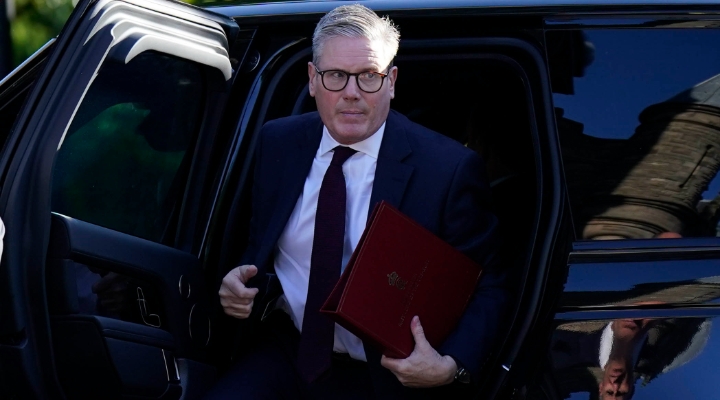Christopher Johnson: Welcome to Morningstar. My name is Christopher Johnson and today I'm joined by Laura Foll, Portfolio Manager at Janus Henderson. Laura, thank you so much for being here with me.
Laura Foll: Thanks for having me.
CJ: So, I'd like to touch on the Janus Henderson UK Equity Income & Growth Fund. So over three years to June 2024, the fund returned 16.64%, slightly underperforming the Morningstar index. So, what's been the key to the fund's positive return rate, would you say?
LF: So, when I think about the dynamics of the fund's performance over the last three years or so, with this fund and with the investment trust we manage, we're all caps. So, we go from the FTSE 100, and we go all the way down to AIM. And the dynamic over the last three years, and to be honest, it extends beyond that as well, is that small and medium-sized UK companies have underperformed the larger companies on the FTSE 100. And if we try and think about the reasons for that, small and medium-sized companies on average, always on average, are more domestic. So, they're more exposed to sentiment towards UK PLC, if you want to call it that, and sentiment towards UK equities and particularly domestic equities has been pretty poor going back to Brexit now. And you can see Brexit as the point at which the valuation discount for domestic equities emerges and hasn't closed in what's now an eight-year time period since Brexit. So, over the three years, sort of coming back to the three years, the FTSE 250 of medium-sized companies, FTSE AIM of much smaller companies, has meaningfully underperformed the FTSE 100. And that has been a drag for us because we have more of those domestic smaller companies. And hopefully, that will change, and that discount will reverse again, but that's been the main dynamic of that performance.
CJ: And have you seen that also in regards to your investment trust? Because for instance, Lowland is a double-digit discount.
LF: So, Lowland is a low teens percent discount at the moment. The historic average would be more like 5. And the way Lowland tends to trade is it sits in the UK equity income sector. But because it has that smaller companies exposure, it tends to trade almost as a sort of halfway house between the income sector and the smaller companies sector. And the UK smaller companies sector, when you're reflecting that domestic sentiment, is at a discount. So, I think that's why Lowland is trading at the higher end of the discounts among the UK equity income peer group. Because people think of it almost as a proxy for UK smaller companies, and that's really reflecting that poor sentiment towards the UK.
CJ: And with discounts in regards to UK valuations, what are your views on the pace of takeovers? I mean, we've seen, DS Smith, BHP and Anglo, you know, so many things are going on at the moment in the market. What's your view on the pace of takeovers? And should we be concerned?
LF: I mean, it's actually extraordinary the pace of takeovers that we're seeing. I've honestly not seen anything like it. We were going through a phase where we were getting about a bid a week. And I think what's different this year to last year – because this is something we were seeing last year, but now it's household names. So, whereas it was smaller companies, we're now talking about IDS, which as everyone knows Royal Mail, as you said, Anglo, we've had DS Smith, which is a paper and packaging firm. These are big, big companies now being bid for, not just smaller companies that go under the radar a bit when smaller companies get taken over.
So, what does it mean? It's nice on the day that you get it. People describe it as a bit of a sugar rush, and I think that's a really accurate way of describing it. It's great for your one-day performance, great for your one-month performance, but then that company is gone and it's not coming back. So, it looks better in terms of our one-year performance numbers – great, good, fine, but it's not a healthy dynamic. I do want something to change. I don't want our performance to be driven by takeovers. So, I really hope that there are a couple of ways that could change.
Firstly, the UK could re-rate. That would be the healthiest way that could change. UK equities getting a higher multiple. Again, you're seeing companies respond to it themselves by buying back their own shares. I think a lot of company boards, company management teams have reached the point of frustration where there's – even smaller companies actually are now buying in their own shares because they can see this discount and they feel vulnerable. So, it's not a healthy dynamic. I want it to change and hope that if we did this again in a year's time, we could say, well, actually, there isn't as much of a discount of UK equities compared to the rest of the world. So, we're not seeing – it would be great to not see the takeover activity, actually, that we're seeing now.
CJ: What other solutions do you see to remedy this issue?
LF: So, buybacks would definitely be one and that's within companies' control.
CJ: But is there something political that could take place?
LF: I think what we're seeing now is I hope the beginnings of a cross-party consensus on it. So, things like the Brit Isa seem to – it's only £5,000 per person in the scheme of things. It's not going to be the silver bullet, but it seems like there is cross-party consensus on things like that. I think Labour have expressed some willingness to lend support to the UK capital markets, I think increasingly because of that point around it is now household names being taken over. It's reached a point where the worry about it has filtered out beyond a few vocal people in our industry towards the wider public and there is this understanding that actually we have a problem here and if we want to have deep, healthy capital markets, we need to do something about it.
CJ: My final question to you is about the health of the investment trust industry within the UK. We've seen a lot of consolidation within the investment trusts. Do you think they as a format will survive in Britain?
LF: I think they will. I think it's a genuinely valuable investment proposition for the consumer and I think that's why they will survive. Let me explain why. So, take an income fund for example. If you as a consumer want to have a very predictable level of income – and obviously the capital can move up and down and you can't guarantee that – but if you wanted to have, say, a quarterly dividend and you would have a pretty good firm idea about what that dividend is going to be, the investment trust as a vehicle is a great one for that because they've often been around for a long time, they've got big, what we call, revenue reserves, a better restored income from previous years that allows you to smooth your dividend. So, a lot of these big investment trust vehicles are very predictable in the income that they pay out and that for you as a consumer or a charity is worth a lot. Whereas if you're running say an open-ended fund and you're paying out everything you get in over every quarter, it's very difficult to make it predictable. Dividends wing around, you get special dividends in, and they don't come in the next year. In an investment trust it is – so that's just one example that's income, some people value income from their portfolios.
But there are lots of other reasons why investment trusts as a vehicle are very good for the retail customer as well as the wealth managers. So, what we're seeing – the reason we're seeing these discounts emerge and some consolidation is that if you're a wealth manager, the liquidity in some of these investment trusts can be challenging. So, you might prefer an open-ended vehicle. So that's why we're seeing the dynamics. But that's specific to more of an institutional client, a wealth manager. Whereas if you're retail and you're buying on Hargreaves or AJ Bell, wherever it is, these investment trusts I think do serve a role and that's why I think they'll survive.
CJ: This is Christopher Johnson for Morningstar UK.




























